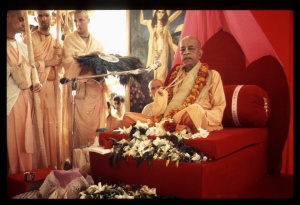CC Madhya 21.125 (1975): Difference between revisions
(Vanibot #0027: CCMirror - Mirror CC's 1996 edition to form a basis for 1975) |
(Vanibot #0020: VersionCompareLinker - added a link to the Version Compare feature) |
||
| Line 2: | Line 2: | ||
<div style="float:left">'''[[Sri Caitanya-caritamrta (1975)|Śrī Caitanya-caritāmṛta (1975)]] - [[CC Madhya (1975)|Madhya-līlā]] - [[CC Madhya 21 (1975)|Chapter 21: The Opulence and Sweetness of Lord Śrī Kṛṣṇa]]'''</div> | <div style="float:left">'''[[Sri Caitanya-caritamrta (1975)|Śrī Caitanya-caritāmṛta (1975)]] - [[CC Madhya (1975)|Madhya-līlā]] - [[CC Madhya 21 (1975)|Chapter 21: The Opulence and Sweetness of Lord Śrī Kṛṣṇa]]'''</div> | ||
<div style="float:right">[[File:Go-previous.png|link=CC Madhya 21.124 (1975)|Madhya-līlā 21.124]] '''[[CC Madhya 21.124 (1975)|Madhya-līlā 21.124]] - [[CC Madhya 21.126 (1975)|Madhya-līlā 21.126]]''' [[File:Go-next.png|link=CC Madhya 21.126 (1975)|Madhya-līlā 21.126]]</div> | <div style="float:right">[[File:Go-previous.png|link=CC Madhya 21.124 (1975)|Madhya-līlā 21.124]] '''[[CC Madhya 21.124 (1975)|Madhya-līlā 21.124]] - [[CC Madhya 21.126 (1975)|Madhya-līlā 21.126]]''' [[File:Go-next.png|link=CC Madhya 21.126 (1975)|Madhya-līlā 21.126]]</div> | ||
{{CompareVersions|CC|Madhya 21.125|CC 1975|CC 1996}} | |||
{{RandomImage}} | {{RandomImage}} | ||
==== TEXT 125 ==== | ==== TEXT 125 ==== | ||
<div class="verse"> | <div class="verse"> | ||
:kāma-gāyatrī-mantra-rūpa, | :kāma-gāyatrī-mantra-rūpa, haya kṛṣṇera svarūpa, | ||
:sārdha-cabbiśa akṣara tāra haya | :sārdha-cabbiśa akṣara tāra haya | ||
:se akṣara | :se akṣara 'candra' haya, kṛṣṇe kari' udaya, | ||
:trijagat kailā kāmamaya | :trijagat kailā kāmamaya | ||
</div> | </div> | ||
| Line 20: | Line 19: | ||
<div class="synonyms"> | <div class="synonyms"> | ||
kāma-gāyatrī-mantra-rūpa—the hymn known as | kāma-gāyatrī-mantra-rūpa—the hymn known as kāma-gāyatrī; haya—is; kṛṣṇera svarūpa—identical with Kṛṣṇa; sārdha-cabbiśa—twenty-four and a half; akṣara—syllables; tāra—of that; haya—are; se akṣara—these syllables; candra haya—are like the moon; kṛṣṇe—Lord Kṛṣṇa; kari' udaya—awakening; tri-jagat—the three worlds; kailā—made; kāma-maya—full of desire. | ||
</div> | </div> | ||
| Line 27: | Line 26: | ||
<div class="translation"> | <div class="translation"> | ||
"Kṛṣṇa, the Supreme Personality of Godhead, is identical with the Vedic hymn known as the kāma-gāyatrī, which is composed of twenty-four and a half syllables. Those syllables are compared to moons that arise in Kṛṣṇa. Thus all three worlds are filled with desire. | |||
</div> | </div> | ||
Latest revision as of 13:46, 27 January 2020
Śrī Caitanya-caritāmṛta (1975) - Madhya-līlā - Chapter 21: The Opulence and Sweetness of Lord Śrī Kṛṣṇa

His Divine Grace
A.C. Bhaktivedanta Swami Prabhupada
A.C. Bhaktivedanta Swami Prabhupada
TEXT 125
- kāma-gāyatrī-mantra-rūpa, haya kṛṣṇera svarūpa,
- sārdha-cabbiśa akṣara tāra haya
- se akṣara 'candra' haya, kṛṣṇe kari' udaya,
- trijagat kailā kāmamaya
SYNONYMS
kāma-gāyatrī-mantra-rūpa—the hymn known as kāma-gāyatrī; haya—is; kṛṣṇera svarūpa—identical with Kṛṣṇa; sārdha-cabbiśa—twenty-four and a half; akṣara—syllables; tāra—of that; haya—are; se akṣara—these syllables; candra haya—are like the moon; kṛṣṇe—Lord Kṛṣṇa; kari' udaya—awakening; tri-jagat—the three worlds; kailā—made; kāma-maya—full of desire.
TRANSLATION
"Kṛṣṇa, the Supreme Personality of Godhead, is identical with the Vedic hymn known as the kāma-gāyatrī, which is composed of twenty-four and a half syllables. Those syllables are compared to moons that arise in Kṛṣṇa. Thus all three worlds are filled with desire.